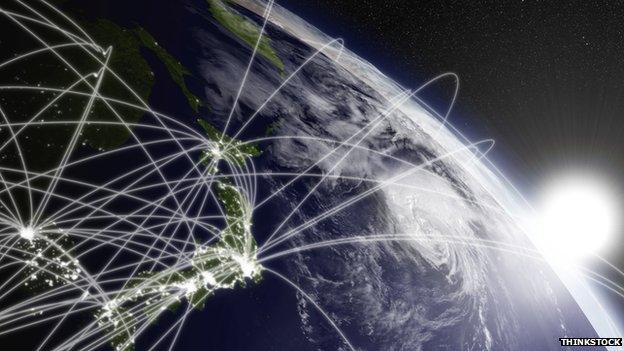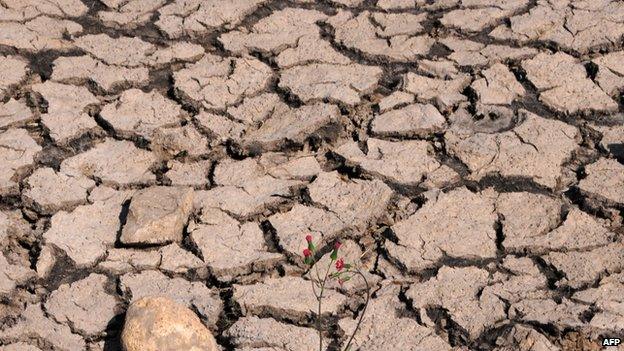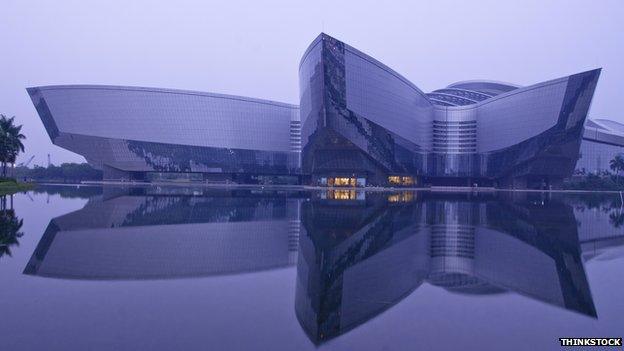Can tech deliver a sustainable future for Planet Earth?
- Published

Technology got us into this mess; can it get us out?
Sustainability means many things to many people, but it boils down to this: saving Planet Earth.
Mankind, as a species, has been too successful for its own good - the global population is forecast to top nine billion by 2050, according to the United Nations Department of Economic and Social Affairs, external.
As a result, there is already a strain on the planet's essential natural resources, particularly food and water, which population growth can only exacerbate.
Meanwhile, our demand for energy - and the life enhancing technologies it powers - has led to the plundering of the earth's hydrocarbons oil, gas and coal, ultimately leading to potentially catastrophic climate change.
In a month-long series of features on the theme of sustainability, Technology of Business will be examining the main challenges facing businesses and asking whether technology - which some would say got us into this mess in the first place - can help get us out.
Business imperatives
Most companies are already being affected by climate change today, directly or indirectly, says CDP, a global not-for-profit organisation specialising in measuring business environmental impact.
Extreme weather, drought and flooding can disrupt production capacity and affect supply chains for a whole range of businesses.
For example, in a CDP survey of 70 European companies, 83% said they had operations in "water-stressed" regions, while 73% said water shortages posed risks to their own operations or those of their suppliers.
"Many businesses rely on basic natural resources like water to make their products," says Zoe Arden, director at think tank SustainAbility. "But it's a depleting resource. The water table in China is plummeting alarmingly and large areas of the country are in drought situations."
In an increasingly globalised economy, few businesses can isolate themselves from the impacts of climate change, population growth and resource depletion, says Emma Price-Thomas, head of sustainability strategy at charity Business in the Community.
"The world is changing very fast. Global megatrends are markedly affecting the business environment. If firms don't address these and think longer-term, they may end up putting themselves out of business," she argues.

Will genetically modified crops have a place in a more sustainable future?
A lot of technology and research is being directed towards reducing water usage in industrial processes and designing products that need less water to work, she says.
Fish fingers
For companies with long supply chains, like supermarkets, the challenge comes down to: "How can we make sure there are enough fish in the sea so we can make our fish fingers?" says Mike Peirce, director of strategy and communications at the Cambridge Institute for Sustainability Leadership (CISL).
Businesses need to adapt to changing consumer demand and become more efficient if they are to survive "the severe challenges" coming their way, he argues.
Justin Keeble, managing director of consultancy Accenture's sustainability services division, agrees: "The business imperative is about mitigating risk and making your business more resilient against resource scarcity and energy insecurity."
Sustainable value
But a persistent problem for many businesses has been putting a value on "going green" and justifying the expense of investing in new technologies.
A major survey of 1,000 global chief executives by United Nations Global Compact and Accenture found that nearly two-fifths of bosses thought that the failure to link sustainability with business value was hampering progress.
This is despite the fact that the vast majority understood its importance and the new business opportunities it presented, the survey suggested.
But Accenture's Mr Keeble argues: "It is possible to put numbers on the risks and opportunities associated with sustainability.
"We estimate that UK business could make £100bn [$169bn; 122bn euros] in productivity savings and that there is a £200bn opportunity for businesses offering sustainable products."

Water shortages are an increasing problem for businesses around the world
Retailer Marks and Spencer has achieved net savings of £135m through its Plan A sustainability programme, he points out.
'Sharing economy'
So what technologies will be key to helping businesses around the world address the sustainability agenda?
"Mobile is having a profound impact," says Mr Keeble. "It is enabling data transparency and giving far more information to consumers who are beginning to think about the provenance of materials and products a lot more.
"This, in turn, is encouraging businesses to believe it is worthwhile developing more sustainable products."
Mobile is also facilitating "the sharing economy", says Ms Price-Thomas, citing car sharing company Zipcar and flat sharing firm Aribnb as examples.
By some estimates, sharing just one car takes another 20 off the road, with the reduction in CO2 emissions that entails.

Car sharing schemes like Zipcar could help drastically reduce carbon emissions
And DIY retailer B&Q's Streetclub concept is encouraging local communities to co-operate and share more, to make better use of existing assets rather than wastefully buying new ones.
"Why does everyone need to buy an electric hand drill when the average use is about six minutes?" asks Mr Keeble. "An embedded SIM card would allow people to use it on a pay-per-use basis."
Smart energy
A big contributor to climate change and resource depletion is transport.
It accounts for about 35%-to-40% of global total energy end use, says Dr Simon Harrison, vice president at the Institution of Engineering and Technology. Heating accounts for a similar percentage.
While switching to lower carbon-producing electricity generation - wind, solar, hydro and nuclear - is important, "using less energy is actually the best way of reducing CO2 emissions," he says.
"We have to ask ourselves: How much global trade do we really need?"

Renewable energy will be an important part of a sustainable future
The switch to more efficient petrol and diesel car engines, as well as the move towards electric vehicles, should make a big difference, Dr Harrison believes.
But unless we approach the whole topic of energy in a holistic way - applying smarter technologies to generation, transmission, storage and end usage - sustainable goals will not be reached, he warns.
Internet of things
The growing number of devices generating digital data - known as the internet of things - coupled with greater computer power to analyse this explosion of data - is another crucial element helping companies and people operate more sustainably.
"By employing sensors and harnessing big data analytics we can drive 20%-to-30% of energy usage out of buildings simply by optimising how air conditioning and heating systems are being operated," says Mr Keeble.

Guangdong Science Centre: China may be a big carbon polluter but is also investing in new technology
Traditionally, manufacturers have had limited insight into how customers use the products they make, says Duncan Ross, director of data science at Teradata, the big data analytics specialist.
But now sensor-laden products, from cars to kettles, wind turbines to widgets, are enabling "much more data to come back so it's possible to design much more sustainable products," he says.
Data - and the insights it delivers - will be integral to a more sustainable future, he believes.
Technology will play a key role in helping businesses operate more efficiently and sustainably.
But equally as important will be the collective will to change.